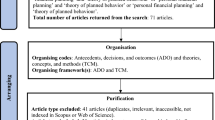Abstract
The Retirement Resources Inventory (RRI) created by C.S. Leung and L.K. Earl is a frequently used self-reported scale for measuring retirement resources. Since it was introduced, 10 scientific papers have been published using the full set of questions and 3 papers using only some of the questions. These have produced ambiguous and inconsistent results with considerable differences in almost all the parameters measured between countries. This paper aims to conduct a systematic review of the scale’s psychometric characteristics and examine the meta-analytic relationship to retirement adjustment, satisfaction and validation for the Slovak population. Instead of the proposed 6-factor structure, we found that different scholars had identified from 3 to 10 factors, and using a Slovak sample we found 4 factors. Internal reliability measured by Cronbach’s alpha showed high levels in all the studies (0.85–0.93). Meta-analytical relationships with RAI showed a strong random effect, r = 0.6 CI [0.35, 0.85], with the RSI, r = 0.509 CI [0.46, 0.56]. But the mean score for the specific subscales differed significantly from the original study in each of the countries it was tested in. Before the RRI is used to measure retirement resources, it should be validated on large samples and adjusted to national specifications to confirm/reject it as a psychometrically valid measure.
Similar content being viewed by others
REFERENCES
Amorim, S.M. and Franca, L.H.D.F.P., Validity evidence of the retirement resources inventory, Span. J. Psychol., 2019, vol. 22, pp. 1–11.
Amorim, S.M. and Franca, L.H.D.F.P., Health, financial and social resources as mediators to the relationship between planning and satisfaction in retirement, Curr. Psychol., 2020, vol. 39, pp. 1–15.
Fadila, D.E.S. and Alam, R.R., Factors affecting adjustment to retirement among retiree’s elderly persons, J. Nurs. Educ. Pract., 2016, vol. 6, no. 8, pp. 112–122.
Floyd, F.J., Haynes, S.N., Doll, E.R., et al., Assessing retirement satisfaction and perceptions of retirement experiences, Psychol. Aging, 1992, vol. 7, no. 4, p. 609.
Hansson, I., Buratti, S., Thorvaldsson, V., et al., Changes in life satisfaction in the retirement transition: Interaction effects of transition type and individual resources, Work. Aging Retire, 2018, vol. 4, no. 4, pp. 352–366.
Hawash, M. and Khalil, M., Post-retirement satisfaction, Alexandria Sci. Nurs. J., 2017, vol. 19, no. 2, pp. 103–118.
Hobfoll, S.E., The Ecology of Stress, Taylor & Francis, 1988.
Hobfoll, S.E., Conservation of resources: a new attempt at conceptualizing stress, Amer. Psychol., 1989, vol. 44, no. 3, p. 513.
Hobfoll, S.E. and Wells, J.D., Conservation of resources, stress, and aging, in Handbook of Aging and Mental Health, 1998, Boston, MA: Springer, pp. 121–134.
Hu, L. and Bentler, P.M., Cutoff criteria for fit indexes in covariance structure analysis: conventional criteria versus new alternatives, Struct. Equ. Model., 1999, vol. 6, pp. 1–55.
Kail, B.L. and Carr, D.C., Structural social support and changes in depression during the retirement transition: “I get by with a little help from my friends,” J. Geront. B Psychol. Sci. Soc. Sci., 2020, vol. 75, no. 9, рр. 2040–2049.
Leung, C.S. and Earl, J.K., Retirement resources inventory: construction, factor structure and psychometric properties, J. Vocat. Behav., 2012, vol. 81, no. 2, pp. 171–182.
Topa, G. and Pra, I., Retirement adjustment quality: optimism and self-efficacy as antecedents of resource accumulation, Appl. Res. Qual. Life, 2018, vol. 13, no. 4, pp. 1015–1035.
Walsh, D.W., “Sport as a resource caravan”: examining the role and efficacy of sport as a resource provider for adults in transition, D. Sci. Dissertation, 2014.
Wang, M., Profiling retirees in the retirement transition and adjustment process: examining the longitudinal change patterns of retirees’ psychological well-being, J. Appl. Psychol., 2007, vol. 92, no. 2, p. 455.
Wang, M., Henkens, K., and Van Solinge, H., Retirement adjustment: a review of theoretical and empirical advancements, Amer. Psychol., 2011, vol. 66, no. 3, p. 204.
Wang, M. and Shi, J., Psychological research on retirement, Ann. Rev. Psychol., 2014, vol. 65, pp. 209–233.
Wells, Y., De Vaus, D., Kendig, H.A.L., et al., Healthy retirement project: Technical report [electronic version]. 2006. Retrieved March 11, 2011. http://www.latrobe.edu.au/alpc/projects/hrp.pdf.
Wong, J.Y. and Earl, J.K., Towards an integrated model of individual, psychosocial, and organizational predictors of retirement adjustment, J. Vocat. Behav., 2009, vol. 75, no. 1, pp. 1–13.
Yeung, D.Y., Adjustment to retirement: effects of resource change on physical and psychological well-being, Europ. J. Ageing, 2018, vol. 15, no. 3, pp. 301–309.
Yeung, D.Y. and Zhou, X., Planning for retirement: longitudinal effect on retirement resources and post-retirement well-being, Front. Psychol., 2017, vol. 8, p. 1300.
Funding
This work was supported by the Slovak Ministry of Education Science, Research, and Sport, VEGA grants nos. 2/0048/18 and 1/0767/21.
Author information
Authors and Affiliations
Corresponding author
Ethics declarations
The authors declare that they have no conflicts of interest.
All procedures performed in studies involving human participants were in accordance with the ethical standards of the institutional and/or national research committee and with the 1964 Helsinki Declaration and its later amendments or comparable ethical standards. Informed consent was obtained from all individual participants involved in the study.
Rights and permissions
About this article
Cite this article
Hanák, R., Pitel, L. Retirement Resources Inventory—Scale Assessment, Relationship to Retirement Satisfaction, Adjustment and a Meta-Analytical Review. Adv Gerontol 12, 236–241 (2022). https://doi.org/10.1134/S2079057022030067
Received:
Revised:
Accepted:
Published:
Issue Date:
DOI: https://doi.org/10.1134/S2079057022030067




